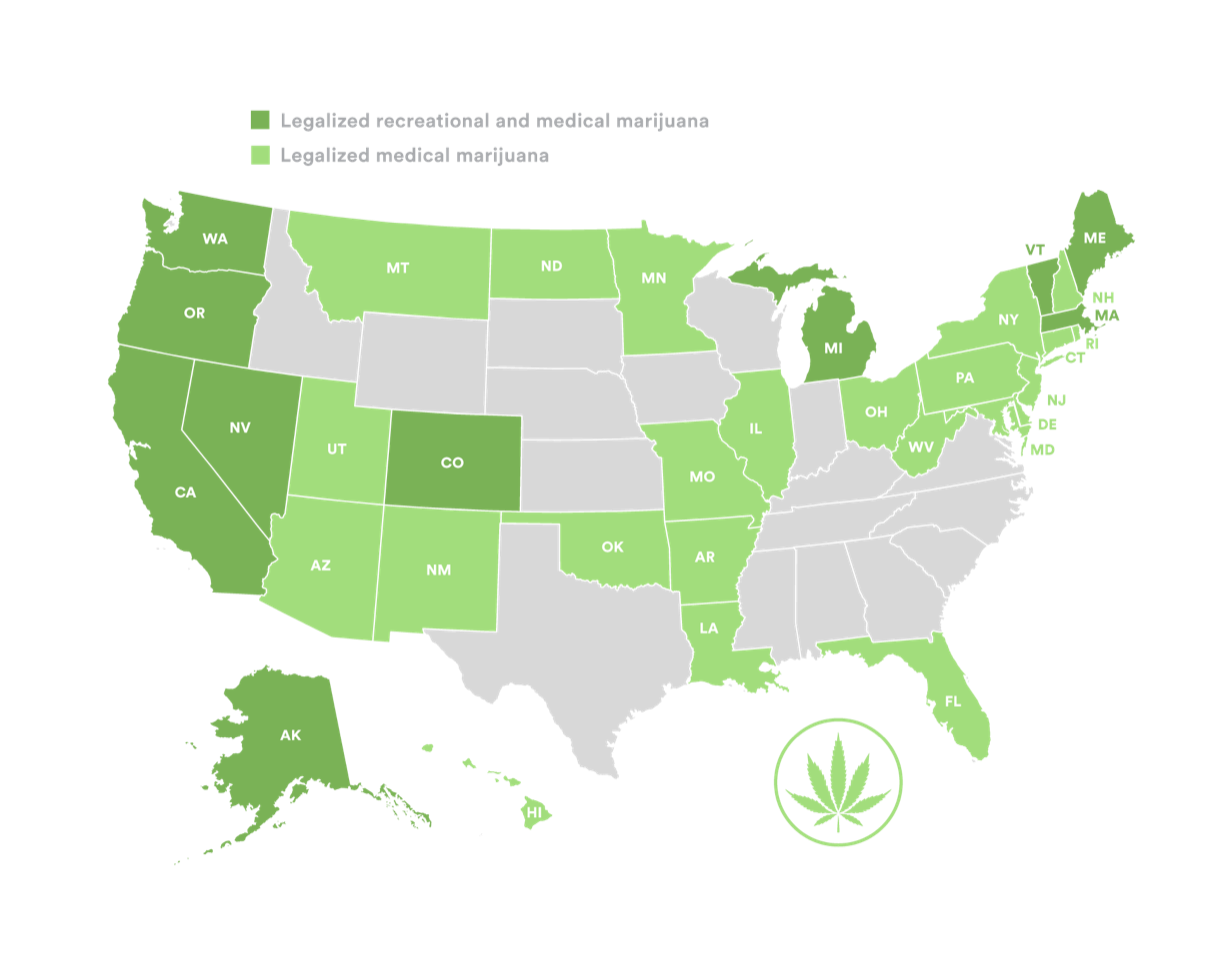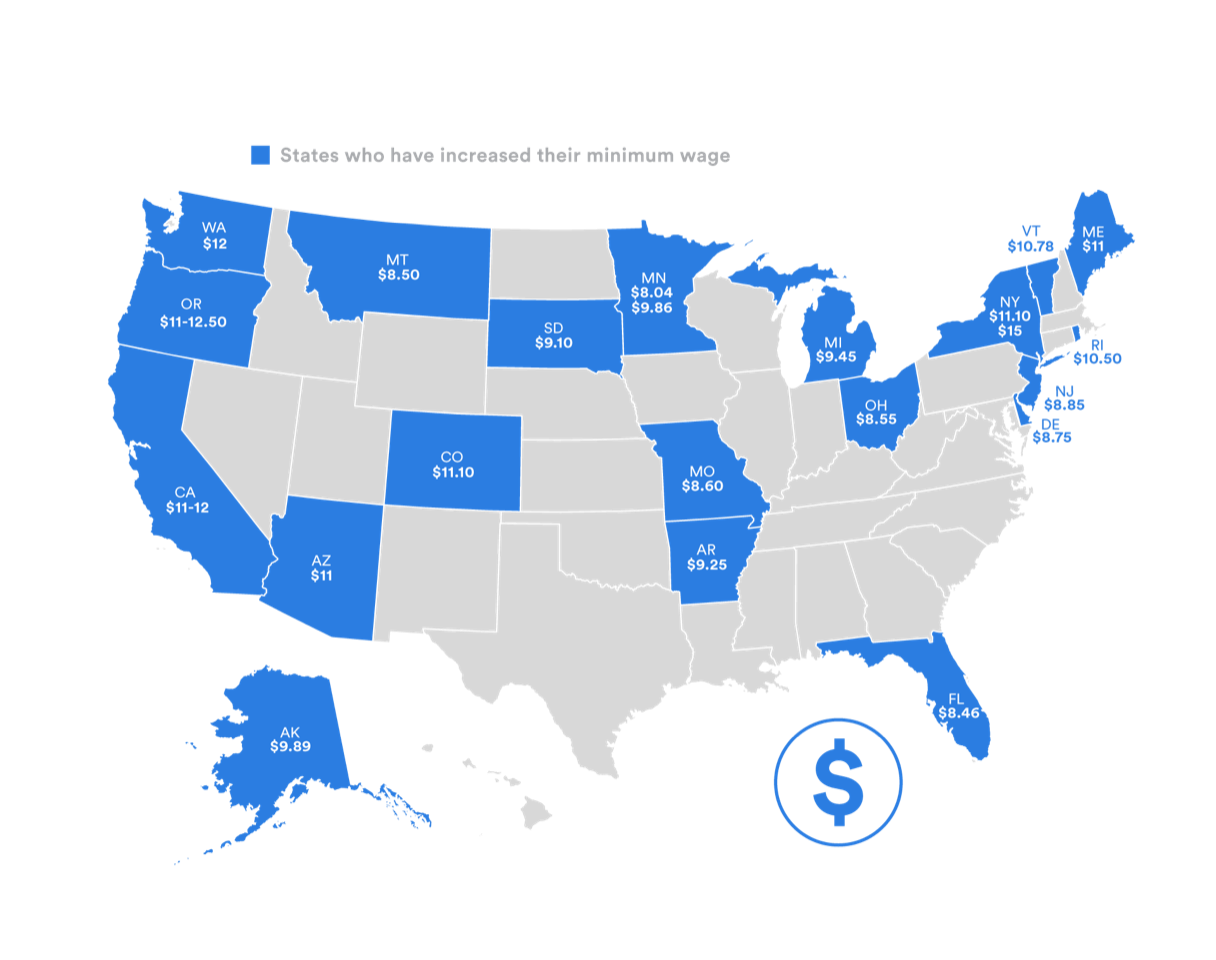As a business owner, there are numerous responsibilities one has to hold to manage and sustain an enterprise. This position of ownership carries the greatest level of risk as well as the highest level of reward. Those who reap the rewards must do everything required to fuel the growth and success of the organization. Amidst the 1,001 duties these individuals must do or supervise, they must stay abreast of the never-ending legislative changes which impact the labor sector. In this article, we share with you four major 2019 law updates which can severely impact the financial health and prosperity of your business—especially if you manage employees.
Change #1: Marijuana in the office?
This year, several states have passed legislation approving the usage of marijuana for medicinal or recreational purposes. As of March 2019, 33 states allowed adults over the age of 21 to possess, use and buy marijuana for recreational purposes while 10 states permitted marijuana for medical usage.
As more states legalize the use of marijuana, business owners have to design and implement new policies preventing the increased use of marijuana at work. All efforts devoted to keeping the work-place drug-free and safe is being undermined by the marijuana laws which provide a special protected status for employees in the workplace. Addictive drugs such as alcohol or tobacco have never had this protected status.
To aggravate the situation, employers have to allocate more financial resources to prevent any form of accidents and lost productivity in the office. Costly litigation could arise from safety issues or discrimination.
 Nonetheless, as many states continue to legalize marijuana, its usage is still illegal under federal law. This complicates matters for employers who try to ensure a drug-free workplace without receiving discrimination lawsuits. On the one hand, they face costly expenses by defending their position under federal laws to maintain safe environments and drug-free workplaces. On the other, they could face costly lawsuits from employees and the general public if they knowingly jeopardize public safety through negligent hiring or discrimination as pressure to accept marijuana use by employees.
Nonetheless, as many states continue to legalize marijuana, its usage is still illegal under federal law. This complicates matters for employers who try to ensure a drug-free workplace without receiving discrimination lawsuits. On the one hand, they face costly expenses by defending their position under federal laws to maintain safe environments and drug-free workplaces. On the other, they could face costly lawsuits from employees and the general public if they knowingly jeopardize public safety through negligent hiring or discrimination as pressure to accept marijuana use by employees.
At this rate, how can companies with workers in multiple states comply with conflicting laws from state to state? How can employers in states where marijuana has been legalized comply with federal law that maintains marijuana is illegal no matter what states say? How much is it going to cost employers to sort all this out through litigation? To receive help on how to navigate through these sensitive issues, please contact XcelHR’s HR professionals for expert advice. Our Human Resource team is composed of professionals who support business owners with HR administration and compliance. They create solutions that help them customize policies and procedures to support the needs of their organization and comply with statutory regulations.
Change #2: Increase in State Minimum wage
Even though the federal minimum wage is $7.25 per hour, 21 states and 49 cities in the nation have raised their minimum wage rate this year. Most of these rates were adjusted to address the impact of inflation and to respond to the popular vote. As a result, employers are now required to pay the higher minimum wage set by the state and counties. This increase in wages can severely impact a business profit line. As a result, employers are encouraged to review their budgets and re-allocate the necessary resources to meet the new state requirements.
Listed below are the 21 states’ new minimum wages for 2019. Specific cities and counties have incurred wage increases as well. To see those specific details, please visit the National Employment Law Project at www.nelp.org.
List of the 21 states and district who increase their minimum wage

Change #3: Employee Overtime Pay Increase
On March 7, 2019, the Department of Labor has issued a Notice of Proposed Rulemaking stating they have begun the process for adopting a new federal overtime regulation. Currently, any salaried employees who are managers or have explicit “specialized skills” and make more than $455 a week or over $23,660 are exempt from earning overtime pay. This salary level was set in 2004.
The new proposition mandates that overtime pay be increased to $679 per week (equivalent to $33,308 per year). This change will make a million more workers eligible for overtime pay. If the new overtime rule is adopted, employers can administer new policies to comply. Here are several options we propose:
- Budget for overtime wages and pay the workers the time-and-a-half wages when they work more than 40 hours in a week.
- Increase the employee’s salary above the threshold, so they are exempt from overtime pay. This option is best for employers who have many employees whose salaries are close to the new salary level and regularly work overtime.
- Crunch the numbers and find out which solutions are best for your firm and discuss it with employees. Let them help you make the best options for the company so you can be prepared for any upcoming overtime rule changes in the future.
For more information on overtime increases, visit the US Department of Labor at www.dol.gov and search for “Overtime2019.”
Change #4: Sexual harassment
This year, several states have passed more laws to help prevent sexual harassment and empower the victims of sexual harassment. Some of these states are California, Delaware and New York.
CALIFORNIA
- In California, businesses with more than five employees must provide at least two hours of anti-harassment training to its supervisors and one hour of training to its employees before the year 2020. After that, the employer must do it once a year. Also, the state requires the employer to make training materials available to its organization.

- California employers are not allowed to place any provisions in a contractual agreement prohibiting a party from testifying about sexual harassment in any administrative or judicial proceeding.
- California employers are prohibited from placing a condition on the opportunity for an employee to receive a raise, bonus or continued employment if the employee has signed a release on a harassment claim for which the employer may be liable. This new law provides stricter guidelines on harassment, making it easier for employees to pursue harassment claims.
DELAWARE
- Delaware has also strengthened its legislation against sexual harassment to include anyone in a workplace. Its legislation focuses on defining what counts as sexual harassment. This law prevents employers from retaliating against an employee for filing a harassment claim in good faith.
- Employers with 50 or more employees are also required to complete an interactive training on sexual harassment by the end of the year 2019.
NEW YORK
- In New York, all state contractors are now required to submit an affirmation that they have a sexual harassment policy and that they provide annual training to all of their employees.
This article concludes our research on major laws which were amended this year 2019. However, there are many more state and local laws which have come into effect this year; some of which could have affected your business. Therefore, it is imperative for business owners and their management team to stay abreast of the latest legislative changes. By knowing these changes, they can create internal procedures that keep their organization in compliance and free from lawsuits and regulatory fines.

Six tips to stay abreast of legislation changes
Here are some tips which can facilitate the process of knowing the legislation and implementing it internally:
- Appoint a Compliance Officer or a single person who is in charge of the company’s compliance operations. Then have this person trained.
- Subscribe to newsletters that send updates from legislators or regulatory bodies. These sources notify your firm when a new regulation has been passed and its requirements and deadlines.
- Participate in seminars, conferences or web trainings that inform your firm on how the new regulation must be implemented.
- Maintain a database or excel spreadsheet of all the regulations that affect your business. This database must include registration dates, approval dates, contact information and the status of their implementation.
- Accurately document internal projects related to compliance and provide status reports.
- If deemed necessary, schedule regular appointments with professional advisers for in-depth support. XcelHR has a strong team of experienced professionals who regularly advises business owners on a myriad of labor and employee-related issues. With professional advice, you can significantly reduce your chances of receiving government sanctions and employee lawsuits.
Once a system of checks and balances has been implemented to manage legislative changes internally, employers must implement a new communication plan to inform employees, clients and partners of the new legal requirement. This communication plan helps establish new policies and enforce business compliance objectives. This plan must make it clear that respecting the law is imperative. If any of the stakeholders are non-cooperative with the new changes, the employer must evaluate the risks of keeping them onboard.
If you have any questions regarding this topic, please contact XcelHR by filling out our contact us form. For additional tips on how to remain abreast of the latest legislative changes, please subscribe to our monthly newsletter or follow us on social media. We are here to help you accelerate the growth of your business.